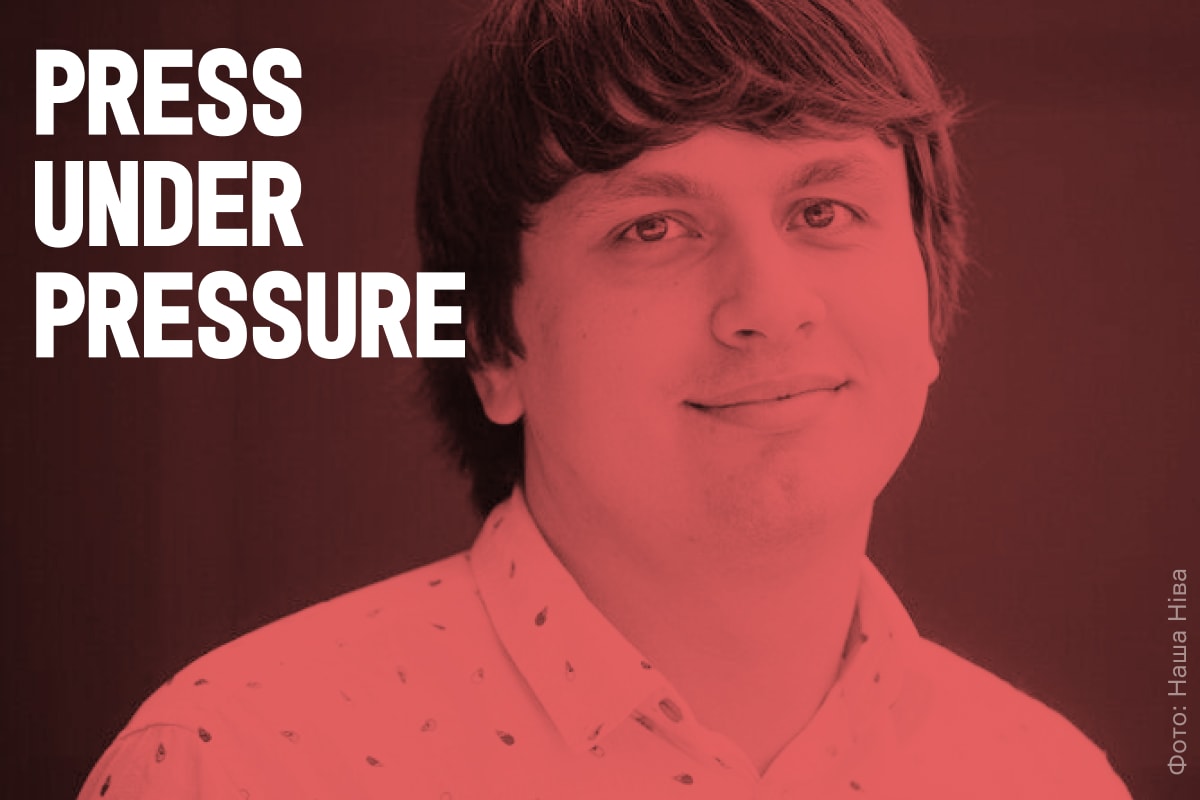
Editor-in-chief of Nasha Niva Yahor Martsinovich has been in prison since 8 July 2021. He was beaten at detainment. He is accused of ‘property damage without evidence of misappropriation’. Human rights organisations recognized him as a political prisoner.
The court hearings of the case against Yahor Martsinovich and his collegue Andrei Skurko started on February 28, 2022. They are being judged for utilities payments made by tariffs for individuals, not for legal entities. Martsinovich and Skurko repaid the alleged damages to the utilities services in full.
On March 15, 2022 Andrei Skurko and Yahor Martsinovich were sentenced to 2.5 years in prison. He served his term and was released on August 18, 2023.
Yahor Martinovich’s colleagues, friends, his brother and mother tell about what he’s taught the editorial staff, why hadn’t he become a sports journalist and what he was up to as a child.
Here you can read the history of Nasha Niva’s persecution and how the publication is operating now.

The last time I saw Yahor Martsinovich was in the Investigative Committee stairwell on July 8, 2021. They led me upstairs and him downstairs. I could see him, but he couldn’t see me because he was looking down. ‘Keep up! Move!’ they shouted at him. Yahor said, ‘I feel dizzy’. Indeed, his steps felt heavy, as if he was injured. His escort officers said something else to him, but I couldn’t hear.
It was the first time I saw Yahor like that. He had always been optimistic and full of energy and there, he could hardly walk.
Later, when I was already at Akrestsina, I learned that Yahor had been beaten at detainment. They put a boxing helmet on his head—Atsyom Harbatsevich’s helmet which someone had once put on Ivan Lutsevich’s bust and left there. Such a post-modernist combination of legacy and modernity, cultural tradition and fighting spirit. So they put that helmet on Yahor’s head and they beat him.
They didn’t beat me, Andrei Skurko or Volha Rakovich at detainment or searches, but they did beat Yahor. Why? Maybe he was unlucky with the officers; the Internet already has the names of those who beat him. That beating is the faith of our intellectual class now. There’s a film, ‘Kupala’, Yahor played a bit part there. One day, there’ll be a film ‘Martsinovich’ and this scene of beating the editor-in-chief with a helmet on his head will be its central scene.
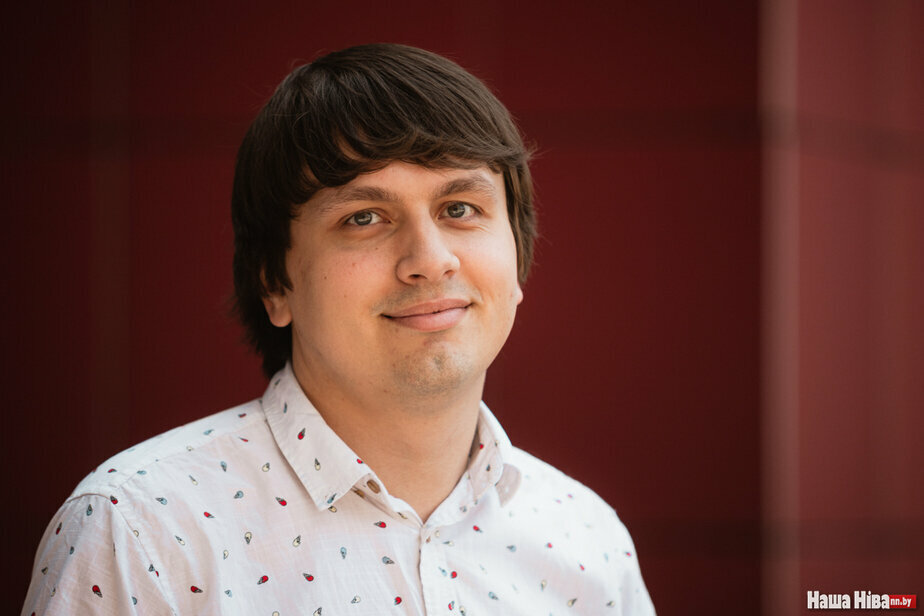
Yahor Martsinovich. Photo: Nasha Niva
* * *
Martsinovich came to Nasha Niva in 2008. We had a competition for vacancies and there was a huge response! We received more than 50 applications for two positions.
Yahor Martsinovich has been an excellent writer since the beginning. His texts required no editing. Not a word, not a comma. And he took complicated topics from the very start; the best investigations were his. A journalist by design.
‘I’m trying to understand which moment eventually brought me here’, Yahor joked in one of his letters from prison. ‘Maybe that interview in 2008? Because after that everything was so harmonious, consistent, almost along a straight line.’
I am extremely proud that in his other letter from prison, Yahor called the atmosphere at Nasha Niva at that time fantastic because of its being Belarusian, its creative freedom, its honesty. If he remembered it, then my life and suffering were not in vain.
* * *
Yahor is a natural leader. It’s when everything fell into place. His writing ability, the ability to analyse information, his gift of mastering new technologies, his charisma, love of life, realism and the will to say no. It became clear to everyone that he was the best, he had to lead ‘Nasha Niva’. We all gave way to him. And he was as good the editor and director, as he was the reporter.
He brought Nasha Niva to the top of professionalism. Never before him was the publication in such high demand. This, however, was the very reason for a blow. It is the drama of journalism under a dictatorship. When you’re the best, be ready to take a blow. And God forbid you be not strong enough to stand it.

I met Yahor for the first time at Volnae Slova (a contest organized by the Belarusian Association of Journalists. — Ed.). I was green behind the ears and received an award in the Debut nomination. And Yahor was an experienced author awarded for his investigative journalism.
We met properly when I came to work at Nasha Niva in summer 2016. Yahor was not the editor-in-chief yet. I was a fourth-year student at the faculty of journalism, worked at Rehianalnaja Gazeta (an independent publication in Maladziečna established in 1995 and forced to stop printing in July 2021. — Ed.). It was a completely new level for me, new knowledge and experience. Yahor was exactly the person who led me, taught me serious, proper journalism.
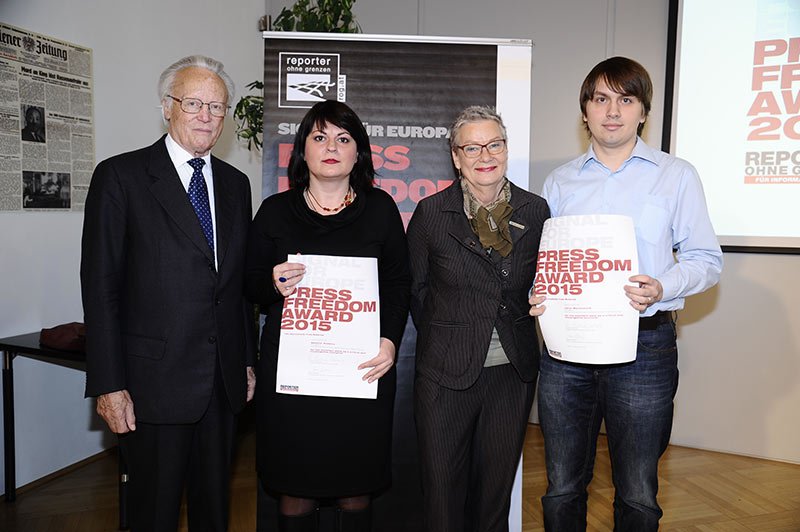
Yahor Martsinovich received Press Freedom Award 2015 for the investigation about the houses of Belarusian officials. Photo: Yahor Martsinovich’s Facebook page
I always sat by Yahor’s side when he edited my texts. He got very annoyed when I asked to explain what exactly he was correcting — to avoid the same mistakes in the future. It was so strange for him, like, ‘Dear God, what is there to not know? Why are you sitting here?’ But he was patient, answered all my endless questions.
Yahor taught me headers. He has, among his other capabilities, a unique competence to create sharp, bright, smart headers. It is his super power which distinguishes Nasha Niva. I hope he passed his expertise on. He is in prison now, sometimes he sees our materials and headers. There were no remarks on our work so far.
When Yahor became the editor-in-chief, it was unusual in the sense that it’s uncommon for Belarusian mass media to be managed by young people. Yahor was 28 at the time, if I remember correctly, and it was super-progressive that he was appointed the editor-in-chief. We were so happy for him and it was absolutely obvious for us. Yahor has a lot of unique competencies creating a powerful combo which allowed Nasha Niva to leap in its online presence, in its promptness and approach.
As well as the fact that Nasha Niva managed to stay up-to-date, follow trends and be with its readers over time—that is also thanks to Yahor’s management as the editor-in-chief.

A bust of Ivan Lutskevich broken during a raid in the office. Photo: Nasha Niva
Yahor is not merely our boss, he is a friend to us all. Relationships at the editorial office have always been good. We’ve worked as one team, had strong horizontal connections. We also played board games all together and travelled. We tried to keep up our team spirit.
Yahor charged us with his energy, optimism. He was always positive, never tired and managed to do everything: play football, be in touch with the editorial office and solve problems during the day, at night and on weekends, travel and be with his family.
Yahor is a superhero for us, we miss him a lot.
Thank you, Yahor, for training us by your own example, strength, bravery, for giving us the power to move on despite all the hurdles. We keep the work you were doing thanks to you and for you. And can’t wait to see you again when you’re free.

Yahor has been near journalism literally since he was a child. Our parents had met when they both worked at Litaratura I Mastactva (LiM) newspaper. It was in the 1980s. The newspaper was very popular back then, during the perestroika time. The famous article about Kurapaty by Zianon Paznyak was published in LiM.
When we were children, something was always about the mass media, journalism, newspapers, magazines. Me and Yahor even played stamps in a rather peculiar way. Many stamps mark certain people: Kasciuška, Kalinouski. These people were alive for us, they formed their parliaments, led political parties, they owned TV channels and newspapers. We imagined a quite large system of independent mass media.
Yahor and I issued our own handwritten magazines. Yahor’s was initially named Mir (‘world’ in Russian. — translator’s note), then it turned to Belarusian language and changed its name to Svet (‘world’ in Belarusian. — translator’s note). Early issues of my brother’s magazine were handwritten, the last ones he typed on a computer.
Our family is very humanitarian. Our grandmother was the author of handbooks on literature. Her husband was the corresponding member of the Academy of Sciences, a well-known textologist who studied the works of Yakub Kolas, Maksim Haretsky and other writers; he edited many collections of literature works. Our mother and father are not only journalists, but also writers.

Photo provided by Dzianis Martsinovich
When we were still at school, we started to work with Ranitsa newspaper in Belarusian language. It was 1999, I was 13 years old, Yahor 11. We were published quite often, then started to work with the Perekhodny Vozrast newspaper in Russian language.
Our first text was a joint one, signed by two authors. Then some texts were joint, some written by each of us independently. Our early publications were about sports, the very first one was a football quiz. Yahor was already fond of sports back then; I thought he would become a sports journalist. Now he still loves the topic, he’s good at it and knows it well and he could be a proper sports journalist but he doesn’t want it. So it’s rather a hobby now.
After graduating from the lineup of Belarusian State University, my brother entered the faculty of journalism. By that time, he already had a certain experience with publications even though it hadn’t yet been ‘grown-up journalism’. He had many publications in Belarusian language which is not surprising: both our parents have written and still write in Belarusian, there are plenty of books in Belarusian at home. So Yahor never had any difficulties with Belarusian language.
* * *
Yahor came to Nasha Niva due to his conscious position. He knew what that was. At first, he wrote about economy only, then he became deputy editor-in-chief and after a while, Andrei Dynko left the position of editor-in-chief for him.
Yahor prefers analytical journalism, searching information, data. His multiple victories in the Volnae Slova contest are the evidence of demand for his texts.
My brother is not only a good journalist, but a good editor, as well. I compared materials in various editions and I saw that Nasha Niva put a different emphasis, sometimes their header was better. Yahor has done a lot to make his publication popular. He made a conscious decision that everyone must read Nasha Niva, it must be interesting for everyone. And before it lost the nn.by domain, the edition grew consistently and was among the top ones in Belarusian journalism. I consider Yahor’s contribution to this matter huge.
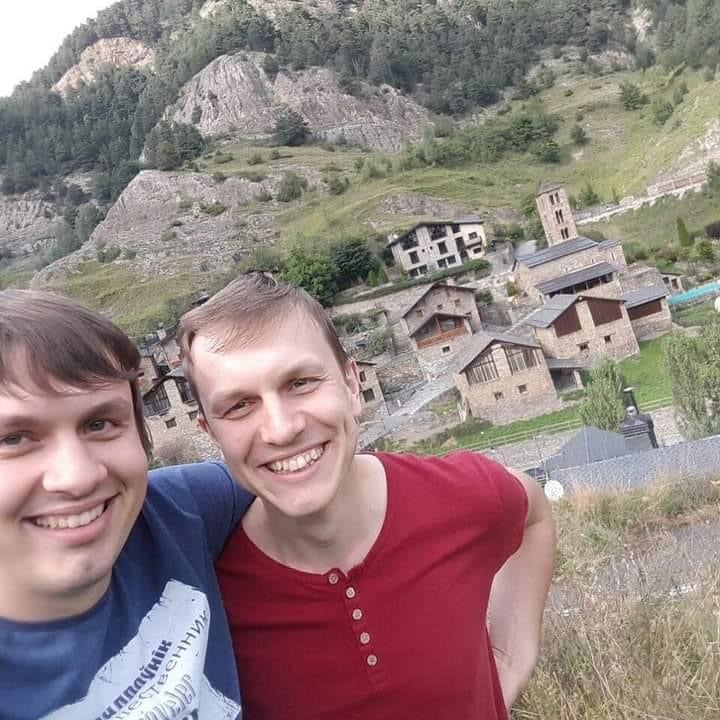
Photo provided by Dzianis Martsinovich
* * *
Yahor is the most practical one in our family. When we bought a computer he figured everything very quickly. I asked him how he did it and he said, ‘I disassembled it and then assembled again.’ He is the driver of progress in our family. There’s always been numerous technical details we could ask him about and he would always help even though he could be busy.
My brother is open to anything new. He loves traveling, discovering the world for himself and for others. If not for Yahor, his impetus and intuition, we would stay home for a long time travelling to the neighbouring countries at best.
Low cost travels are now popular and it seems only the laziest person has never travelled, but when Yahor started travelling it all seemed so mysterious, travelling cost much, only a few people in our family knew foreign languages. And he pushed us, said we should travel. He has an ability to find unbelievably cheap routes. Thanks to Yahor our whole family had an intense trip across Europe in 2010.
It felt like he was leading us by the hand in these trips. Until I learned and started travelling on my own, he always showed me on the map, ‘You arrive here, then turn there and take that bus.’ He helped our mother the same way.
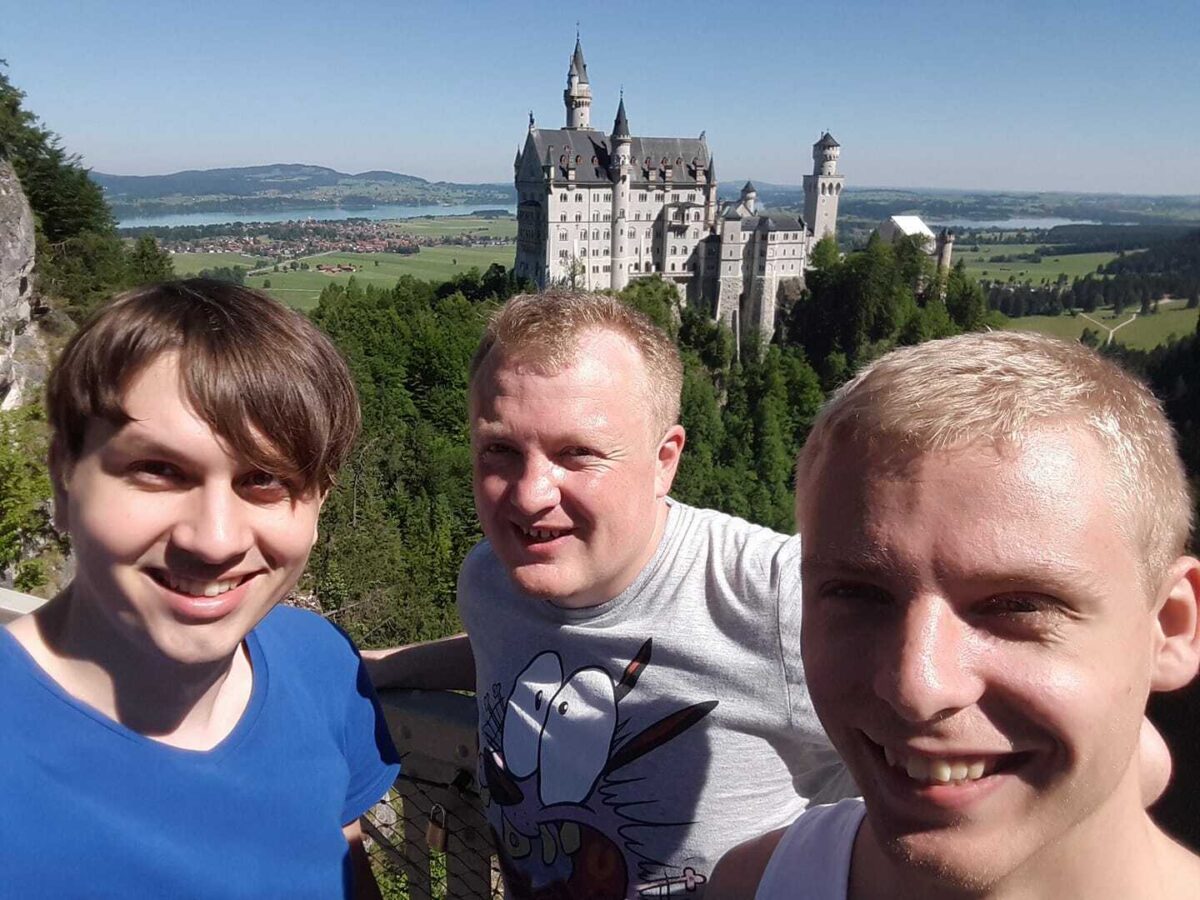
Trip in Germany. Photo: Yahor Martinovich’s Facebook page
Yahor visited all the European countries except Spain, if I remember it correctly. The same applies to the regions and districts of Belarus. He could not leave Belarus in the past year because it was prohibited, so he travelled across his home country. Out of 118 districts of the republic he hasn’t yet been to about five. We had a sort of competition: we phoned each other and told which districts each of us visited and what we’ve seen there.
Our family are fellow thinkers. We have been proud and will be proud of Yahor. He is not just a brother to me, he is my best friend.
«Let’s pretend it never happened». Yahor Martsinovich told about his detainment in August 2020
* * *
My brother doesn’t want to and will not leave Belarus. It is his principled position. He is a man of integrity with a distinct system of values.
His detainment and the manner of it were a shock. He was beaten. And the situation itself… Yahor knew very well — we spoke every day — that sooner or later it might happen.
Yahor’s letters from prison are upbeat. He’s holding on bravely. He is an optimist and he believes everything will be fine, this will end soon and he will be free. He is certain of his innocence.

We met when Yahor submitted his CV to Nasha Niva. He was still a student at the faculty of journalism at the time, around 2008 or 2009. I still remember one of his first articles was a mini interview with Yakub Kolas’ son. Then he stuck at the editorial office, became one of the leading authors, led the Economics section for a long time. It was called Haspadarka (Belarusian for ‘economic practices‘. — translator’s note), page 4 of the newspaper. In addition, he wrote numerous stories, travelled a lot.
Yahor had a series of stories based on his travels to the officials’ home towns, talks with their neighbors, relatives. He became famous as a journalist after a publication of materials about the officials’ property. Yahor was the first in Belarus to do that. He had his own methods which he never disclosed to anyone. He made very good materials about Drazdy and other micro-districts where the officials built their houses.
And it was not only about the officials, but, for example, about the residents of the ‘House of Chizh’.
Yahor had been the winner of the Volnae Slova contest for many years in the Investigative Journalism nomination. The organisers eventually got tired of him winning, I think, so they invited him to join the judging panel.
We’ve worked with Yahor for more than 10 years. He is very sympathetic. He’s not like ‘I’m the boss and you are all my subordinates’. He encouraged everyone to address each other and him informally. We could discuss not only working issues, but also personal ones, or just chat.
Yahor can see non-standard topics, materials. Nasha Niva with Martsinovich was famous for numerous small exclusive materials. It distinguished us from other mass media and it was to a great extent thanks to Yahor.
Yahor travelled a lot. It’s his great passion. He’s visited many European countries; the only country he hasn’t visited is Spain. He left it for later, for desert. And then COVID-19 happened and he couldn’t go. Then he started traveling across Belarus every weekend when the weather was warm.
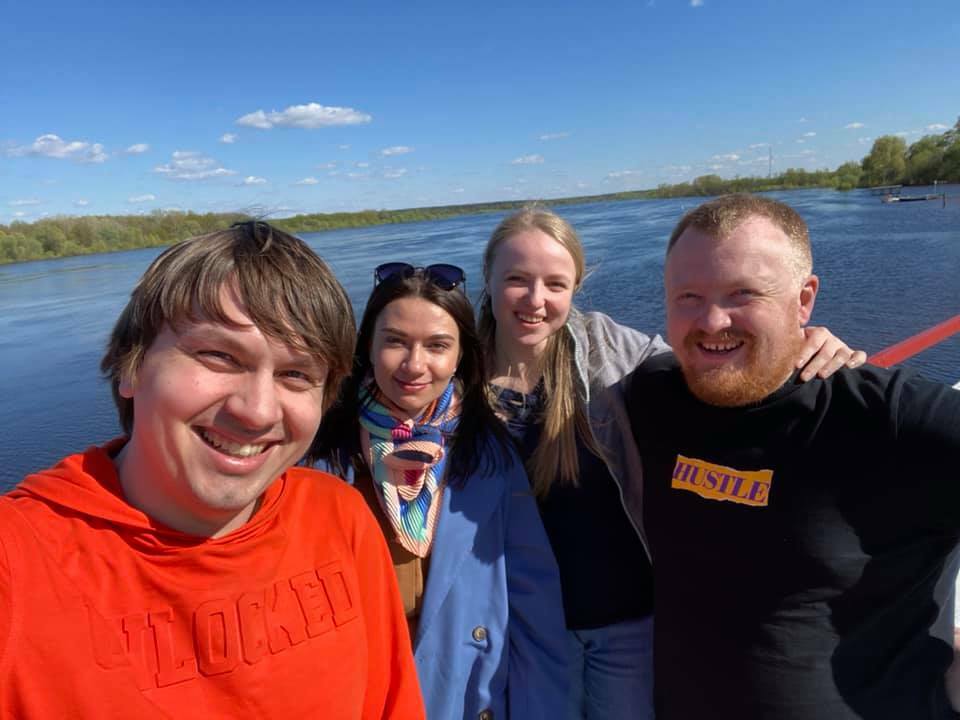
One of Yahor’s travels in Belarus. Photo: Yahor Martsinovich’s Facebook page
He wanted to visit all the districts in Belarus. He only hasn’t been to Dubrouna, Buda-Kašaliova, Haradok and Čerykau districts.
Our latest trip was to Mahiliou region, its most Eastern part, Hocimsk, Mscislau, Kryčau. We stayed in Hocimsk for the night at a ‘wonderful’ hotel. We tried to watch ⅛ of the European football championship and we had to adjust the antenna, as we used to do in the 1990s.
But the most interesting part was how we tried to get to Samatevičy village in Kasciukovičy district. It was once a huge village of a couple of thousands people which appeared inside the evacuation zone after Chernobyl. There is a majestic church in the Russian Byzantine style which is now in the middle of the forest. We went there.
I don’t know if there are other sights in Belarus as hard to reach as this Samatevičy village. We found one road on the map, it seemed about 700 meters along it. And it was summer, we were wearing shorts and T-shirts. So we got out of the car… And mosquitoes, botflies, horseflies attacked us from all sides, massive hords of them. We tried to proceed fighting off the insects, but it wasn’t working.
I might have turned away and left, but Yahor said no. He found another road, half overgrown. We tried to get through in a car, scratched the bumper — the road was very bad. Got through. And looked at and took photos of it.
On the way back, mud was splashed across the car, I found at least four ticks on myself. But Yahor was beyond happy that he managed to reach the place.
It is always interesting with Yahor. By the letters people receive I can see that he is giving actual lectures in his cell telling about history, cities, other things.
Yahor will do everything absolutely right. I am confident about him, as I am about Andrei Skurko. In situations like this, they always act and will act this time with dignity.

Many mothers usually praise their children, admire them even if it’s far from reality. But I will try to recall the facts more assuring than emotions.
On the eve of the first school year, Yahor could read, write, print on a typewriter. We came to school to submit documents with a sheet of paper with two columns printed on it naming capital cities, towns, famous football players, military commanders. The teacher accepting the documents looked at it and said, ‘What would he do in the first grade? We’ll admit him to the second one at once.’
Yahor studied at school with no effort, playing. Lyceum of BSU had a great influence on him. He got into an intellectual environment gathering the best people.
Speaking of journalism, he started quite young. He and his brother had flowing energy which had to be directed somewhere. When teenagers, they worked with Ranitsa newspaper where Mihas Khamets was the editor-in-chief. He was very friendly to them. Then there was Perekhodny Vozrast newspaper. Yahor is now 33, he’s been in print for over 20 years now.
He is a very unusual person, very energetic, with his own inner pace of movement, thinking. Yahor is not prone to advertising and self-advertising. His principle is ‘once finished, move on’. My mother, when she was still alive, once said, ‘Did Yahor tell you he visited us and fixed all the computers?’ I said, ‘No, I didn’t.’ Thus I found out what and where my son was doing.
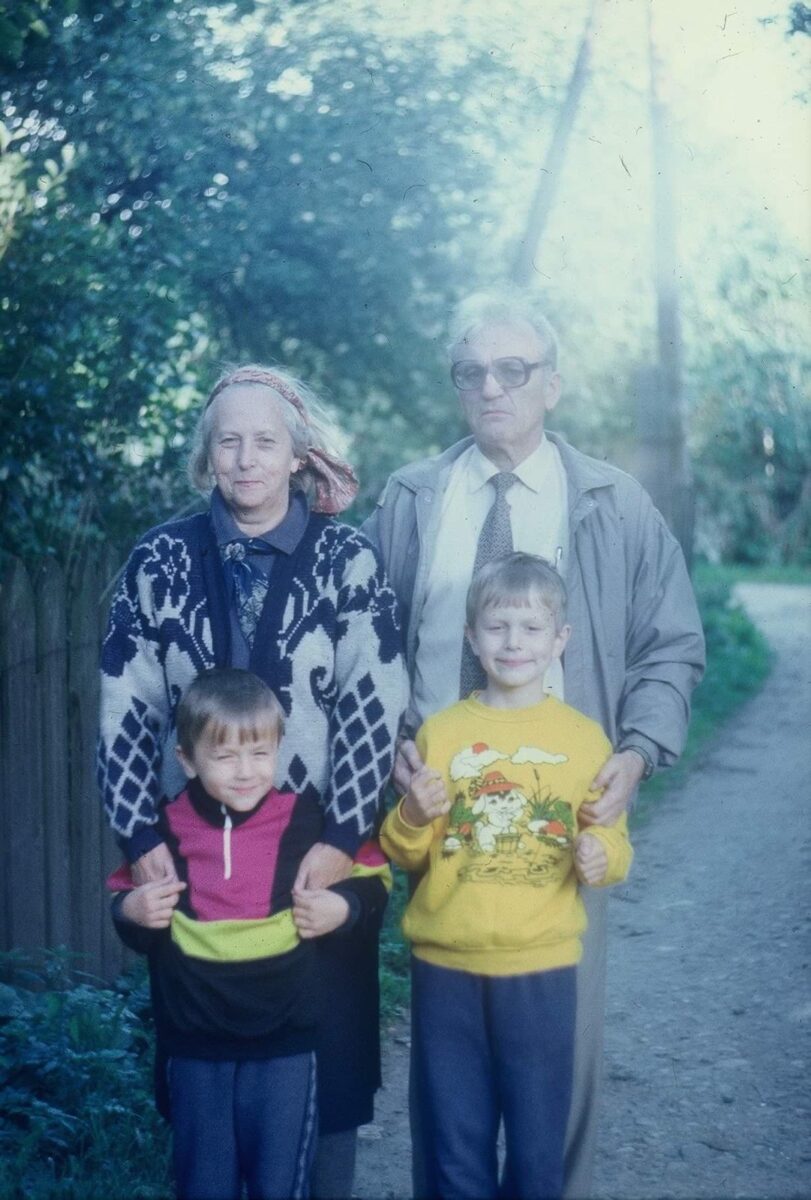
Photo provided by Tatsiana Mushinskaya
Many members of our family influenced Yahor’s development. We’ve always discussed news and events in literature, theatre. His grandmother, my mother, who was the author of handbooks for school for the whole country, had a great influence. His grandfather, doctor of sciences, professor. It trains some sort of not private, but civil understanding of things. We’ve always had a vast library to choose and read from. Intellectual, Belarusian-language interests always prevailed.
Nasha Niva website was one of the best known when he became the head of the publication. It is a legendary publication established over 100 years ago, with Yanka Kupala among its first employees. It’s a brand, an invaluable acquisition. So I understand that when he became the head of it in 2017, it was an honour and at the same time, certain danger. You know how they treat Belarusian language. People can treat you differently when you consistently defend Belarusian values.
Sometimes I regretted that my son did not work somewhere safer. Each mother has a feeling, like in a poem, ‘Come under my wing, it’s quiet and warm here.’
But Yahor has a very strong character, he is consistent, he can’t be molded like dough. Parents can influence children at a young age and now he’s a grown man with an established system of values.

Photo provided by Tatsiana Mushinskaya
Distinguishing three features of Yahor’s character I would name inner peace, capability to not accuse everyone else when something goes wrong and friendly firmness when a person speaks the truth without offending.
We are always happy to receive letters from Yahor. We got used to e-mail, instant messaging, messengers. And here, a letter arrives in a week or ten days and the same takes to send one. It is a bit funny and curious in the 21st century. However, some people never receive letters, so we are happy with what we have.
My son is an optimist by nature. He doesn’t dramatise the situation, but considers it a certain experience: meeting people who he might never get in contact with, if not for the circumstances. Certainly, we want this absurd to end as soon as possible. And it is clear that when several people are held in Valadarka for 3.5 thousand roubles in utility payments it’s absurd and ridiculous. There is a debt, then make them pay twice the amount and release them.
A person’s life is the highest value, each month, each day. Those who are forced to be in prison now — who will compensate them for this time of their only life? How would they compensate? One can breathe fresh air or the air of a cell. One can eat what they want or what they are given in prison. When one’s free they can choose what to do, who to meet, how to plan their day and in there, you have to adapt to some odd conditions. Did I bring up my son for him to spend time in prison? It’s not normal, some theatre of the absurd. Innocent people are made guilty. Why? To draw the society’s attention from those who are actually guilty.
Yahor, we love you, we are waiting for you and we want to reunite with you as soon as possible.
Terms and conditions
Partial or full reprint is permitted subject to following terms of use.
An active direct hyperlink to the original publication is required. The link must be placed in the header of the reprinted material, in the lead or the first paragraph.
Reprints, whether in full or in part, must not make changes to the text, titles, or copyrighted photographs.
When reprinting materials from this page, attribution must be given to the Press Club Belarus “Press under Pressure” project, collecting evidence of repression against independent media and journalists in Belarus.